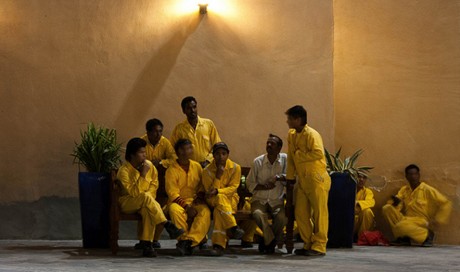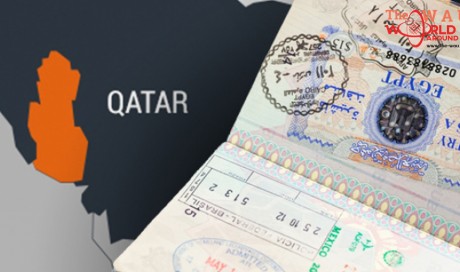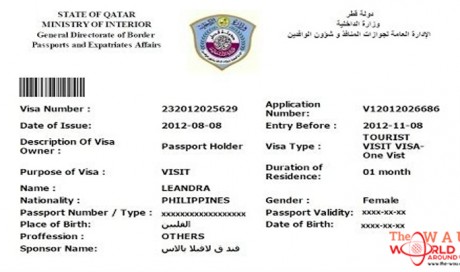Companies should have same visas to hire expatriates: Qatar Labor
A new law by the MADLSA stipulates that foreign immigrants seeking to change jobs in Qatar can only be hired by those companies which have the same visa for the same nationality, gender and profession as that of the candidate.
The Law no. 21 of 2015 on the Entry, Exit and Residency of Foreign Nationals puts forth that migrant workers who have completed the stipulated tenure with their current employers are eligible for change of jobs.
However, MADLSA in a statement has clarified that the change can be effected only if a valid vacancy is available.
For example, a "Filipino male accountant" who wants to leave his current employer and join another firm can be hired only by a company that has the approval for employing a "Filipino male accountant".
These regulations are meant for all private-sector jobs in the country. MADLSA also stipulates that candidates who are on fixed-term contracts and want to join a new firm should submit a notice of 30 days prior to the termination of the contract.
Moreover, if an employment contract is open-ended, a worker should stay in the job for a minimum five years to be eligible for a change.
Furthermore, MADLSA announces that the new employer should not have any restrictions on recruitment, such as a hiring ban imposed by the authorities concerned for previous violation’s reported by the Gulf Times.
As a matter of act, age of the person looking for a new employer should be less than 60 years, as stated by MADLSA.
Meanwhile, the ministry is also planning to stop the renewal of employment contracts of expatriate workers aged 60 and above. The decision stipulates the exit of the expatriate worker after reaching the age of 60 years and accordingly, his residence permit would not be renewed.
Job change support
Expatriates who encounter problems or technical issues while trying to change over to a new job can contact the technical support section at the Ministry of Administrative Development, Labour and Social Affairs at [email protected] or Phone: 40288888.
Are you currently facing work ban in Qatar ?
If you have worked in Qatar but now you are banned you can come back without NOC if you have new offer by a new employer.
New Job offer from new employer that is all you need to come back to Qatar in case you are facing work ban.
All the work relating to the drafting of the executive regulations of the new law on the entry, exit and residency of expatriates in Qatar has been completed.
According to a report, the Ministry of Administrative Development, Labour and Social Affairs has finished all the necessary procedures regarding the new system of employment contracts.
The new law stipulates that workers who are newly recruited from outside the country will have to sign these before taking up jobs in Qatar.
An awareness campaign will be held through the social and local media to instruct people on their rights and duties in accordance with the new law, as reported by Qatar Tribune.
The ministry will also test the new system of electronic contracts in collaboration with the departments concerned to ensure its ability to meet the requirements.
It may be noted that HH the Emir Sheikh Tamim bin Hamad al-Thani issued Law Number 21, last year which abolishes the stipulations of Law Number 4 of 2009 regarding Regulation of the Expatriates Entry, Departure, Residence and Sponsorship.
The current two-year ban on expatriates who want to come back to the country on a new work visa will no longer be applicable, with the issuance of the law.
Moreover, a foreign worker who has got a new contract to work in Qatar can come back even the next day, provided he has met the other requirements like visa.
Assistant-director general of the Department of Border, Brigadier Mohamed Ahmed al-Atiq, , Passport and Expatriates Affairs, had pointed out that the two-year ban on return of an expatriate worker was directly linked to the sponsorship (kafala) system. Since the new law abolishes kafala, a person who had previously worked in Qatar would not have to seek the approval of his former sponsor if he is recruited by a new employer, reports Qatar Tribune.
Article 26 of the new law puts forth that if a foreign worker is fired as a punitive measure and he did not appeal his dismissal or his plea was rejected by a court, he shall not be permitted to come back to Qatar before the passage of four years.
The Most Awaited Qatar NEW LABOR LAW Fully Explained by Ministry
The new Law No 21 of 2015 regulating the entry, exit and residency of expatriates has stipulated some very crucial provisions for the expatriate workers in Qatar.
One of the first provisions of the law is that the service periods of an expatriate worker will be calculated from the day he/she started working for their employer, including the days of employment prior to the implementation of the law, as announced by Ministry of Administrative Development, Labour and Social Affairs.
The law also puts forth that the workers would no longer be needing the approval of their existing employers to change jobs if they successfully complete the duration of the contract.he expats, as such, need to inform their employer of their intention to change the job before the contract ends.
Similarly, those working on open-ended contracts may change jobs without the permission of the employers, provided they render five years of service.
The expats would need to get the approval of the Ministry of Administrative Development, Labour and Social Affairs prior to taking up their new employment.
If a worker can demonstrate that they have been exploited or mistreated by their employer, the law gives them the right to demand a transfer of employment.
It may be noted that, under the provisions of the law, a job contract is mandatory for obtaining a work visa to Qatar. All prospective migrant workers will be able to see a copy of their job contract, prior to leaving their native countries, a statement from the Ministry noted.
Procedures for applying for an exit permit under the new law and other important aspects of the entry and residency rules have also been detailed by the Ministry, as part of an ongoing campaign to raise awareness among the public of the new law.
The Administrative Ministry in collaboration with the Ministry of Interior held a series of workshops and seminars for this purpose with participation of Qatari businessmen, officials from foreign embassies and representatives of different expatriate communities, as reported by The Peninsula.
An official of the Ministry explained that the Government of Qatar takes a holistic approach to migrant worker welfare. Several new protections for workers during all stages of the migration cycle – from recruitment to repatriation have been included in the new law.
He further added that all expatriates, be it domestic, blue-collar and white-collar, will benefit from the changes. The new law is set to benefit 2.1 million salaried workers.
Fresh options for workers to change jobs and apply for exit permits, as well as new regulations to prevent the exploitation of low-income workers have been included in the law.
Moreover, the existing Kafala system would be abolished and it its place will come a modernised, contract-based system.
In cases where the employer rejects a leave request, the expatriate worker can appeal to the Exit Permit Grievances Committee, which has to respond to all requests within 3 days, as part of the provisions of the new law.
Employers can be fined upto QR25,000 per workers if found with confiscated passports. This reportedly will be the toughest financial penalty against passport confiscation within the region.
Ministry solves frequently asked questions
For a better understanding of the new law among the readers, particularly the working class, the Ministry of Administrative Development, Labour and Social Affairs has explained some of the frequently asked questions. These are mentioned as follows:
How can expatriates apply for an exit permit under the new rules?
To apply for an exit permit, for annual leave or an emergency, the workers would first need to submit their application in writing to their employer, as per the terms of their contract.
Exit permit requests will be approved and processed by employers immediately in a majority of cases. If at all the employer rejects the request, expats will be able to apply directly to the Exit Permit Grievances Committee.
Expats are able to submit requests via an e-government services programme, or in-person at government service complexes and police stations throughout Qatar. Once submitted, all exit permit requests received will be decided upon within 72 hours, reports The Peninsula.
The Exit Permit Grievances Committee will then conduct an immediate background check of the applicant to ensure that no active or pending criminal proceedings, or financial claims, are currently against him.
The committee would hold a interrogatory session with the applicant’s employer and ask if he/she have any objections to the request.
Here, valid objections may include reasons like the the employee has committed a fraud or the is attempting to evade prosecution for a crime.
It is then the employer’s task to convince the relevant authorities before the 72-hour working period of the Committee closes, that a criminal case should be opened up against the worker. Failing to do so will automatically grant the worker an Exit Permit.
What will happen if the Exit Permit Grievances Committee is unable to contact the expatriate’s employer?
In case the Committee cannot contact an expatriate’s employer within 72 hours of their submission of exit permit application, the permit would be approved, provided that the worker passes all relevant background checks.
What will happen where there is an emergency and an expatriate needs to return sooner?
Usually, the current maximum for the appeals to be approved is 72 hours. However, in reality the system can operate much faster. During emergency of any sort, the committee can expedite this timing.
Who are the Members of the Exit Permit Grievances Committee, and how does it operate?
The members forming the The Exit Permit Grievances Committee consist of officials from the Ministry of Interior, the Ministry of Administrative Development, Labour and Social Affairs, and representatives of the National Human Rights Committee.
The worker will have the opportunity to contest any evidence that may have been used against them during hearings. They will also have the opportunity to appeal for clemency, in cases where they owe debt but need to return home for a medical or family emergency.
In cases where an expatriate is prevented from receiving an exit permit, will their family members be able to leave the country?
There is no barrier for family members and dependents to leave the country, unless they are a part of any crime committed by the expatriate under investigation.
How will expats be able to change jobs under the new law?
Under the new law, expats will no longer need approval from their existing employer to change jobs if they complete the length of a fixed-contract. However, it is required that expats in fixed-contracts provide written notice to their employer before the contract expires, advising their employer of their intention to change jobs at the end of their contract. The duration to notify the employer will depend on the terms and conditions in the contract signed by each employee.
Expats in open-ended contracts will also be able to change jobs without their existing employer's permission, provided that they complete a five-year service period. However, it is required that expats in open-ended contracts provide a written notice to their employer prior to changing job.
All Expats who wish to change jobs will also need to get the approval of the MADSLA prior to taking up their new employment.
How are service periods calculated under the new law?
All service periods will be calculated from the day that the employee started working for their employer. This includes all days of employment accumulated prior to the implementation of Law No. 21 of 2015.
Will expatriates be able to change jobs prior to completing their agreed service period?
In cases where a worker wishes to change job prior to completing the length of their contract, they will need to seek permission from their existing employer. In cases where the worker can demonstrate they have been exploited or mistreated by their employer, the law gives them the right to demand to transfer of employment.
If expats leaves Qatar, how long will they need to wait before returning to the country to take up employment?
Expats will be able to return to Qatar and take up employment immediately after being granted a new visa. However, this will not be the case for workers who have been found guilty of misconduct whilst working for their previous employer in Qatar.
How long do employees have to find another contract in the case of termination of a contract?
Employees can get up to three months’ time to find work by notifying the Ministry of Administrative Development, Labour and Social Affairs. After finding a new job, the workers will have to return to the Ministry and present their new employment contract. Those who do not find any work within the given period must leave Qatar.
If You Get FIRED or TERMINATED, You will Get FOUR YEARS BAN as per Qatar New Labor Law. How You Can Avoid THIS?
According to Article 26 of the new law, if a foreign worker is fired as a punitive measure and he did not appeal his dismissal or his plea was rejected by a court, he shall not be permitted to come back to Qatar before the passage of four years.
* If your terminated or fired for as a punishment, you will be BANNED for FOUR Years.
* If the reason of termination is wrong/unexpectable dismissal, you can appeal in the Court.
* If Court rejected your appeal or if you failed in the appeal, you will be face four years Ban.
Although the text of the law is available in Arabic, no official English translation has been circulated yet. The following is an unofficial translation of Law No. 21 of 2015:
Share This Post














